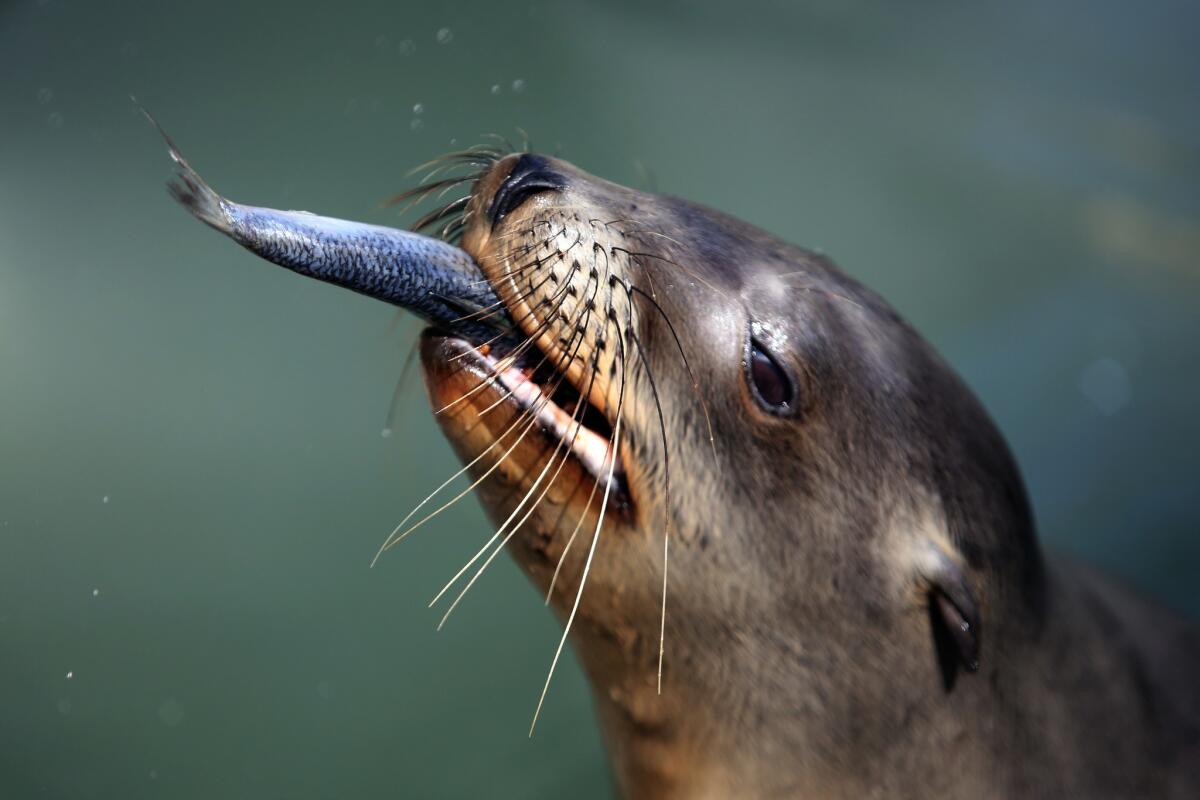Sea lion pup taken from Dockweiler Beach parking lot, witness says

- Share via
A sea lion pup was believed to be in possible peril Sunday after a witness told police that he saw a group of people harassing, then removing the animal from a parking lot at Dockweiler State Beach in Playa del Rey, authorities said.
The witness, described as a Los Angeles resident, said he saw two men and two women in their 20s throwing trash, and at one point a concrete cinder block, at two sea lion pups at around 3 a.m. Sunday morning, police said. The pups were not injured, he told police.
The witness, who was collecting containers for recycling at the time, saw one woman wrap one of the pups in a comforter and pack the animal in the trunk of a dark-colored Honda Civic, said Lt. Lydia Leos of the Los Angeles Police Department.
Federal law prohibits the harassment, hunting, capture or killing of sea lions.
The car was last seen heading south on Vista Del Mar, police said. The license plate number, according to the witness, ends with the numbers 56.
After the car left the witness called police, who around 4 a.m. contacted Peter Wallerstein, president of Marine Animal Rescue, a nonprofit group that helps stranded sea animals get back to the ocean.
Wallerstein headed to the scene and was able to find the second sea lion hiding in the bushes of a nearby bike path. The pup was unharmed, Wallerstein said.
Wallerstein said sea lions often wander onto land looking for food, and people have tried to take them in before. He said most people have good intentions but make bad decisions.
“They’ll put them in their bathtubs, then call us to rescue them,” Wallerstein said.
But there have been some aspiring pet owners among the good Samaritans, said Wallerstein, who has been rescuing marine mammals for 30 years. One caller kept a sea lion in their backyard for three days before calling Wallerstein and giving it up.
“It wasn’t eating, so they thought they’d better call someone,” Wallerstein said.
Sea lions do not make good pets, Wallerstein said. They bite with 10 times the strength of dogs, and their mouths are dirtier and more bacteria-ridden than any other mammal, Wallerstein said. Keeping a sea lion carries a penalty of up to a year in prison and fine of up to $10,000, Wallerstein said.
More and more sea lions have been turning up on land looking for food, Wallerstein said. Last year he rescued 294 marine mammals, most of them sea lions. This year, he’s already up to 321 -- most of them sea lions as well.
According to the National Marine Fisheries service there were 350 pup strandings on California beaches in January, 850 in February and 1,050 in March.
The unusually high number of sea lion strandings could be connected to fluctuations in the population of sea lions on the California coast over the last few years. Experts at the National Oceanic and Atmospheric Administration believe that there’s less prey available for sea lions, and pups are driven to the shore because they can’t find food. Warmer seas could also be a factor.
The pup rescued Sunday morning was emaciated, Leos said.
“Hopefully he survives, and we find the other one,” Leos said.
Police have contacted the NOAA, but it’s not yet clear who will be investigating the pupnapping, Leos said.
More to Read
Sign up for Essential California
The most important California stories and recommendations in your inbox every morning.
You may occasionally receive promotional content from the Los Angeles Times.











